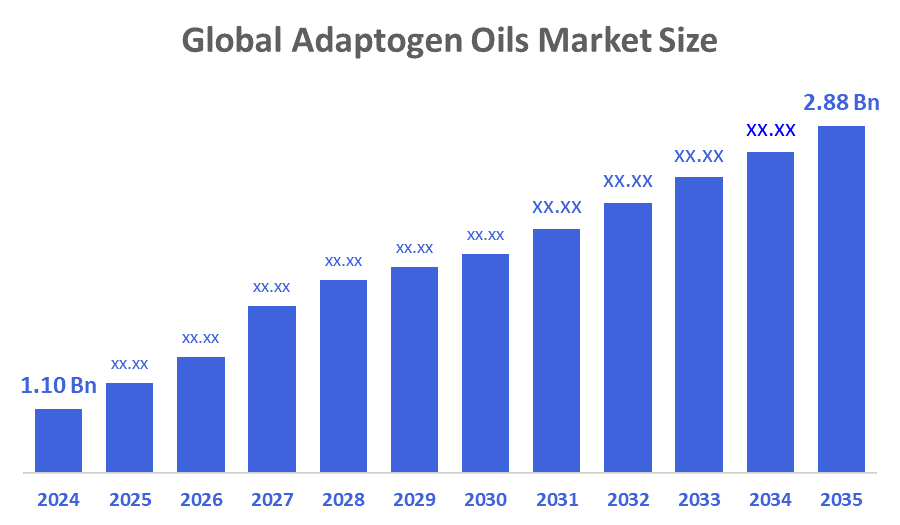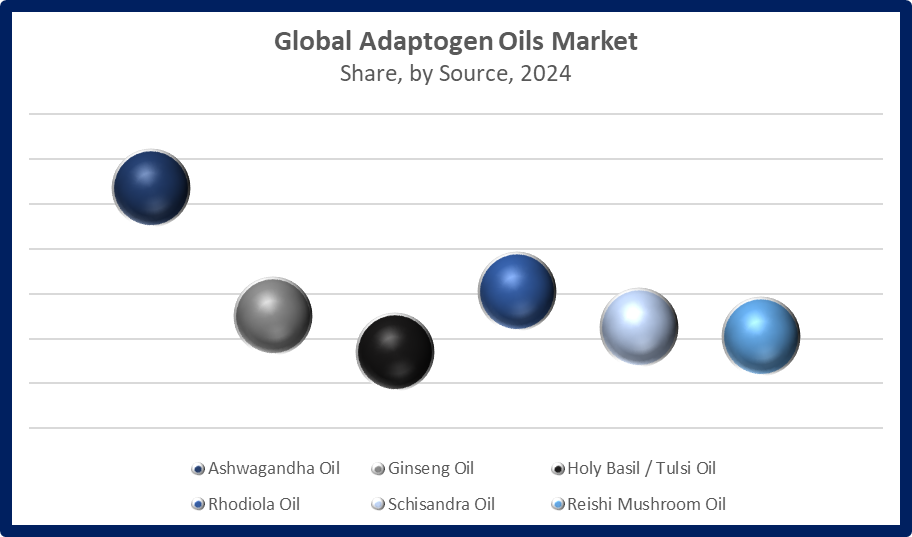Global Adaptogen Oils Market
Global Adaptogen Oils Market Size, Share, and COVID-19 Impact Analysis, Impact of Tariff and Trade War Analysis, By Source (Ashwagandha Oil, Ginseng Oil, Holy Basil / Tulsi Oil, Rhodiola Oil, Schisandra Oil, and Reishi Mushroom Oil), By Application (Dietary Supplements, Cosmetics & Personal Care, Functional Foods & Beverages, and Pharmaceuticals), and By Region (North America, Europe, Asia-Pacific, Latin America, Middle East, and Africa), Analysis and Forecast 2025 - 2035
Report Overview
Table of Contents
Adaptogen Oils Market Summary, Size & Emerging Trends
According to Decisions Advisors, The Global Adaptogen Oils Market Size is expected to Grow from USD 1.10 Billion in 2024 to USD 2.88 Billion by 2035, at a CAGR of 9.14% during the forecast period 2025-2035. Emerging trends include increasing consumer demand for organically sourced adaptogen oils, innovations in extraction and stabilization methods to maintain potency, and rising adoption in both human wellness (dietary supplements, cosmetics) and animal health sectors.

Key Market Insights
- Asia Pacific is expected to account for the largest share of the adaptogen oils market during the forecast period.
- Dietary supplements remain the dominant application segment, while cosmetics & personal care and functional foods are emerging as high-growth areas.
Global Market Forecast and Revenue Outlook
- 2024 Market Size: USD 1.10 Billion
- 2035 Projected Market Size: USD 2.88 Billion
- CAGR (2025-2035): 9.14%
- Asia Pacific: Largest market in 2024
- North America: Fastest growing market
Adaptogen Oils Market
The adaptogen oils market revolves around plant-derived oils that contain adaptogenic compounds known for promoting stress relief, cognitive function, immune balance, and overall well-being. These oils are extracted from traditional herbs such as ashwagandha, tulsi, ginseng, rhodiola, reishi, and schisandra. They are widely used across nutraceuticals, functional beverages, personal care, and natural remedies. With increasing awareness about stress-related disorders and the demand for holistic healing alternatives, manufacturers are focusing on developing advanced extraction techniques and shelf-stable oil formulations. Clean-label and organic trends are driving demand, while e-commerce platforms are expanding consumer access globally. However, challenges such as variability in botanical yield, standardization of active compounds, high cost of organic certification, and regulatory complexities persist. Innovations in oil delivery formats and cross-industry collaborations are expected to further shape market growth in the coming decade.
Adaptogen Oils Market Trends
- Rising demand for organic, sustainable adaptogen oils in clean-label products
- Use of encapsulation and stabilization technologies to extend shelf life
- Growth in blended adaptogen oils combining multiple herbs for synergistic effects
- Expanding use in premium cosmetics and functional beverages
- Increased R&D into pet supplements and veterinary applications
Adaptogen Oils Market Dynamics
Driving Factors:
Consumers increasingly seek plant-based
The global shift toward natural stress relief and mental wellness is propelling demand for adaptogen oils. Consumers increasingly seek plant-based, sustainable health solutions that support holistic well-being. Adaptogen oils are gaining traction as key ingredients in natural beauty products and functional foods, fueled by rising health awareness. The expanding retail landscape, including online and specialty wellness stores, makes these products more accessible. Additionally, personalized wellness trends encourage tailored formulations, driving market growth. Together, these factors position adaptogen oils as essential components in the fast-growing natural health and beauty sectors worldwide.
Restrain Factors:
High production costs pose a significant restraint on the adaptogen oils market
High production costs pose a significant restraint on the adaptogen oils market, largely due to variability in raw material quality and complex extraction methods. Regulatory hurdles, including strict standards on health claims, further challenge market growth. Synthetic alternatives often offer cost-effective substitutes, limiting the market potential for natural oils. Moreover, some adaptogen oils have a short shelf life, complicating storage and distribution logistics. These factors combine to create barriers for manufacturers and may slow adoption rates, especially among price-sensitive consumers and markets with stringent regulatory environments.
Opportunity:
Personalized wellness and beauty sectors are expanding rapidly
Emerging economies present a vast growth opportunity as awareness of adaptogen oils increases alongside rising disposable incomes and expanding health-conscious populations. Clinically backed formulations, supported by scientific validation, can drive consumer confidence and broaden market appeal. Adaptogen oils are particularly well-positioned to capitalize on growing demand within vegan, gluten-free, and allergen-free product categories. Additionally, the personalized wellness and beauty sectors are expanding rapidly, offering brands the chance to develop niche, customized products that cater to individual needs, thereby boosting adoption and market penetration globally.
Challenges:
Certification costs for organic
The adaptogen oils market faces challenges related to limited clinical validation for many traditional herbs, which impacts consumer trust and regulatory approvals. Complex supply chains involving sourcing from diverse geographic regions create risks around quality and consistency. Certification costs for organic, sustainable, and fair-trade claims add financial and operational burdens for producers. Furthermore, maintaining the bioactive potency of adaptogen oils throughout processing, storage, and transportation is critical yet difficult, requiring advanced technology and strict quality controls to ensure efficacy and consumer satisfaction.
Global Adaptogen Oils Market Ecosystem Analysis
The global adaptogen oils market ecosystem comprises herbal cultivators, extraction and oil manufacturers, nutraceutical and cosmetic formulators, end-product brands, regulatory bodies, and consumers. Effective collaboration across this supply chain from cultivation to final formulation is essential for ensuring quality, traceability, and regulatory compliance. Manufacturers are focusing on transparent sourcing practices, clean production methods, and sustainable packaging solutions to meet growing consumer demand for ethical and eco-friendly products, strengthening trust and driving market growth.
Global Adaptogen Oils Market, By Source
The ashwagandha oil segment accounted for the largest revenue share in the global adaptogen oils market during the forecast period. Ashwagandha, a cornerstone herb in Ayurvedic medicine, is well-known for its adaptogenic properties that help the body manage stress, improve energy levels, and support hormonal balance. Its oil form is particularly favored in dietary supplements and wellness formulations due to its high bioavailability and multipurpose usage. With strong consumer awareness, especially in Asia Pacific and North America, ashwagandha oil continues to dominate market share across both nutraceutical and personal care applications.

The rhodiola oil segment is projected to be the fastest-growing during the forecast period. Rhodiola rosea, native to cold, high-altitude regions, is gaining popularity in the West for its cognitive-enhancing, anti-fatigue, and endurance-boosting benefits. Its essential oil extract is increasingly used in premium functional beverages, nootropic products, and energy-boosting supplements. The growing scientific validation of rhodiola’s stress-relieving properties, combined with the demand from athletes and working professionals, is accelerating its adoption globally, particularly in Europe and North America. Rising demand for mental wellness solutions and adaptogenic innovation in food and beverages is expected to further fuel growth in this segment.
Global Adaptogen Oils Market, By Application
The dietary supplements segment represented the largest share of the global adaptogen oils market, accounting for approximately 44% of the total revenue during the forecast period. Adaptogen oils are highly valued in the dietary supplement industry for their concentrated bioactives and natural origin. They are commonly used in oil-based capsules, tinctures, and blends that target stress relief, immune support, energy enhancement, and hormonal balance. The segment benefits from increasing consumer inclination toward preventive health and wellness, especially in developed markets like the United States, Germany, and Japan. Furthermore, expanding e-commerce channels and clean-label demand are encouraging supplement brands to introduce oil-based adaptogen products that offer high efficacy with minimal processing.
The cosmetics & personal care segment is anticipated to be the fastest-growing application area over the forecast period. Driven by the clean beauty trend and rising demand for natural, plant-based ingredients, adaptogen oils are increasingly being formulated into facial oils, serums, shampoos, and moisturizers. Oils derived from tulsi, reishi, and schisandra are particularly sought after for their anti-inflammatory, anti-aging, and skin-calming properties. Consumers are drawn to holistic skincare routines that address both external beauty and internal balance, making adaptogen-infused cosmetics an emerging category. Growth is especially notable in premium skincare and organic personal care markets across South Korea, India, the U.S., and Nordic countries.
Asia Pacific is expected to account for the largest share of the global adaptogen oils market during the forecast period,
holding a dominant position driven by the deep-rooted presence of traditional medicine systems such as Ayurveda, Traditional Chinese Medicine (TCM), and Siddha. The region benefits from strong consumer trust in herbal remedies, abundant availability of adaptogenic botanicals, and well-established local manufacturing infrastructure. Countries like India and China lead the regional market due to their favorable agro-climatic conditions that support large-scale cultivation of ashwagandha, holy basil, ginseng, and other adaptogenic herbs. Rising health awareness, government support for AYUSH and herbal sectors, and growing demand for organic wellness products further contribute to the Asia Pacific’s leadership in the market.
North America, on the other hand, is anticipated to register significant growth during the forecast period, holding approximately 27% of the global market share.
The growth in this region is largely supported by the rising consumer preference for natural wellness products, clean-label formulations, and plant-based alternatives. In the United States, adaptogen oils are being rapidly adopted into mainstream dietary supplements, functional beverages, and organic skincare lines. Consumers are increasingly turning to botanical solutions for stress relief, energy enhancement, and immune support, especially post-COVID-19. Major brands and retailers are promoting adaptogen-infused oils and blends as part of holistic wellness routines, further expanding market visibility.
WORLDWIDE TOP KEY PLAYERS IN THE ADAPTOGEN OILS MARKET INCLUDE
- Nutra Industries Inc.
- Organic India
- Amax NutraSource
- NutraCap Labs
- Changsha Organic Herb Inc.
- Emami Limited
- REBBL Inc.
- PLT Health Solutions
- Thorne Research Inc.
- Vital Nutrients Inc.
- Others
Product Launches in Adaptogen Oils Market
- In May 2023, Emami launched a new essential oil blend infused with adaptogens, specifically designed to help users manage stress and improve sleep quality. This product targets the growing consumer demand for natural wellness solutions that support mental relaxation and restful nights.
- In September 2023, REBBL introduced a line of adaptogenic oil-based beverages incorporating reishi and ashwagandha oil emulsions. These beverages cater to health-conscious consumers seeking functional drinks that promote overall well-being through the benefits of traditional adaptogenic herbs.
Market Segment
This study forecasts revenue at global, regional, and country levels from 2020 to 2035. Decisions Advisors has segmented the adaptogen oils market based on the below-mentioned segments:
Global Adaptogen Oils Market, By Source
- Ashwagandha Oil
- Ginseng Oil
- Holy Basil / Tulsi Oil
- Rhodiola Oil
- Schisandra Oil
- Reishi Mushroom Oil
Global Adaptogen Oils Market, By Application
- Dietary Supplements
- Cosmetics & Personal Care
- Functional Foods & Beverages
- Pharmaceuticals
Global Adaptogen Oils Market, By Regional Analysis
- North America
- US
- Canada
- Mexico
- Europe
- Germany
- UK
- France
- Italy
- Spain
- Russia
- Rest of Europe
- Asia Pacific
- China
- Japan
- India
- South Korea
- Australia
- Rest of Asia Pacific
- South America
- Brazil
- Argentina
- Rest of South America
- Middle East & Africa
- UAE
- Saudi Arabia
- Qatar
- South Africa
- Rest of the Middle East & Africa
Check Licence
Choose the plan that fits you best: Single User, Multi-User, or Enterprise solutions tailored for your needs.
We Have You Covered
- 24/7 Analyst Support
- Clients Across the Globe
- Tailored Insights
- Technology Tracking
- Competitive Intelligence
- Custom Research
- Syndicated Market Studies
- Market Overview
- Market Segmentation
- Growth Drivers
- Market Opportunities
- Regulatory Insights
- Innovation & Sustainability
Report Details
| Scope | Global |
| Pages | 258 |
| Delivery | PDF & Excel via Email |
| Language | English |
| Release | Oct 2025 |
| Access | Download from this page |
